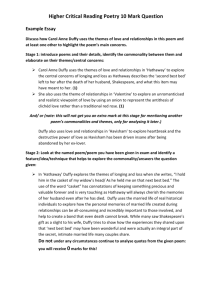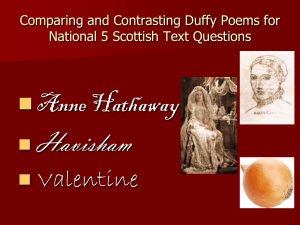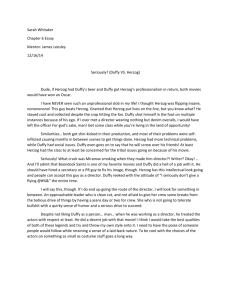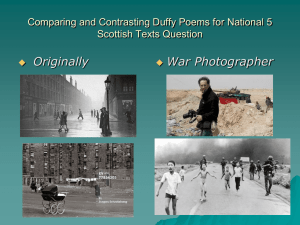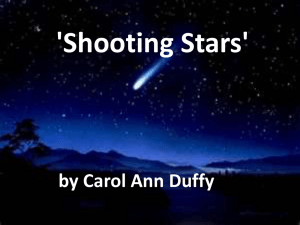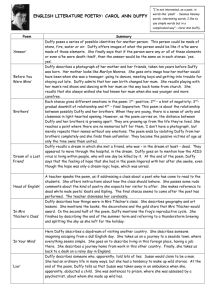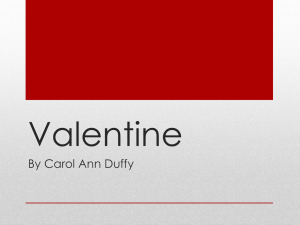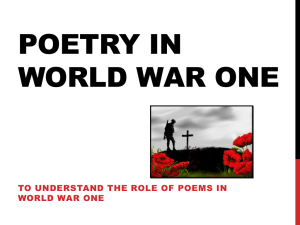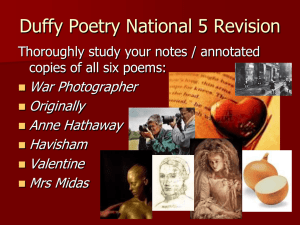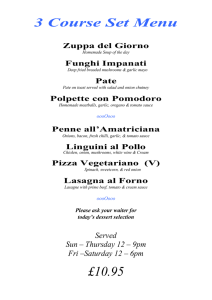Valentine - Textual Analysis Marking Guide
advertisement
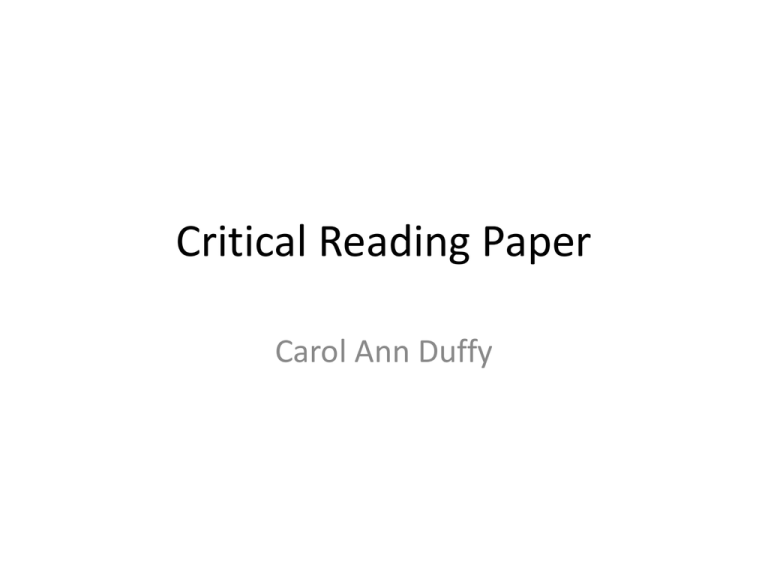
Critical Reading Paper Carol Ann Duffy 1. In lines 1, 11 and 12, the poet asserts that she wishes to reject traditional gifts of love. With reference to the poem’s structure, explain how this attitude is emphasised. (2) Example answer: • Duffy’s use of short, one-line stanzas that contain only one short sentence… – …emphasises her blunt / direct / unsentimental approach to her expression of love for her partner. (1) • Duffy’s repetition of “Not a”, following by several typical gifts of love… – … reinforces the similarity of lines 1 and 12, drawing the reader’s attention to the fact that Duffy continues to reject conventional, clichéd romantic gestures. (1) 2. The speaker gives his/her beloved an onion. Explain the contrasting images from lines 2–10 that show the suitability of this gift. (4) Example answer: • Duffy compares the onion to “a moon wrapped in brown paper” to show her unsentimental approach to expressing love. – The moon is an enormous natural satellite which orbits the earth. It is a white spherical object which has romantic associations. Brown paper is fairly dull and lacking in glamour, and is often used to wrap up objects. (1) – The fact that Duffy presents her lover with this gift is appropriate to her unsentimental approach to love, as it shows that, while she has great strength of feeling for her lover, as suggested by giving her a “moon”, she nevertheless wants to express these feelings in an unsentimental way, as suggested by the fact that she wraps this gift up in “brown paper”. (1) 2. The speaker gives his/her beloved an onion. Explain the contrasting images from lines 2–10 that show the suitability of this gift. (4) Example answer: • Duffy compares her lover’s reflection to a “wobbling photo of grief” to show that she is aware of the heartbreak often associated with love. – A photograph is a fixed image of a person or object. If it is said to be “wobbling”, it is distorted in some way. (1) – The fact that Duffy believes the onion will make her lover’s reflection a “wobbling photo of grief” suggests that her lover’s tears will distort her reflection when she looks in the mirror. This indicates both the tears caused by the strong smell of an onion, but also those caused by often upsetting emotions associated with a romantic relationship. (1) 3. Duffy’s realistic approach to modern relationships is explored further in lines 13–17. Show how one example of language demonstrates this. (3) Example answer: • Duffy makes effective use of word choice when referring to the “fierce kiss” of an onion. – This suggests the strong, bitter taste of an onion, and the fact that this taste is not easy to remove. (1) – Duffy uses this description to suggest that the emotions associated with a loving relationship can often be very intense (1), and are not easy to forget. (1) 4. In the final stanza, Duffy makes her thoughts clear on the possible outcomes of a relationship. With reference to one example of language, identify her tone and possible emotions. (3) Example answer: • Duffy makes effective use of word choice when she states that the onion’s scent will “cling” to the fingers of her lover. – This suggests the odour of the onion will stay on her lovers fingers, and will take a long time to fade away. (1) – Duffy uses this description to suggest that the emotions associated with a loving relationship cannot easily be forgotten. (1) “Cling” also suggests that the lover has no choice about whether or not to let go of these emotions – they have made an impact on her that is hard to remove. (1) The Final Question • The final question is worth 10 marks. • It will ask you to compare or contrast the poem you have in front of you with at least one other you have studied by the same writer. • This should be set out in bullet points. Final Question – Marking Guide a) 2 marks can be achieved for identifying things that the two poems have in common, as identified in the question. b) 2 marks can be achieved for reference to the text provided in the question paper. For one technique / idea / feature, do the following: – Provide a relevant reference to a technique/idea/feature (1) – Provide an appropriate comment about it (1) c) 6 marks can be awarded for discussion of similar references to at least one other text by the writer. For three techniques / ideas / features, do the following: – Provide a relevant reference to a technique/idea/feature (1) – Provide an appropriate comment about it (1) 5. With close textual reference, show how the ideas and/or language of this poem are similar OR different to another poem or poems by Duffy which you have read. (10) a) 2 marks can be achieved for identifying things that the two poems have in common, as identified in the question. • The key points of comparison between Valentine and Duffy’s poem Havisham are that they both deal with the same subject matter, romantic love. Each poem is about love, but not the clichéd love of romantic movies and candlelit dinners; Duffy’s poems are dark and sinister, often revealing the most unsettling nature of romantic union. In this way, Valentine and Havisham have many similar ideas and features. 5. With close textual reference, show how the ideas and/or language of this poem are similar OR different to another poem or poems by Duffy which you have read. (10) b) 2 marks can be achieved for reference to the text provided in the question paper. • In Valentine, Duffy recognises the pain which comes with love, the inevitable anguish and heartache that must feature in any emotional connection between lovers. She uses language to convey this idea. The choice of a lover’s gift represented by an onion is unusual and immediately reminds us of the weeping associated with cutting an onion. She uses word such as “blind you with tears” and warns that it will “make your reflection a wobbling photo of grief”. Such imagery reminds us of the trauma of lovers’ arguments and the trials and tribulations of relationships. Rejection, betrayal and discord all cause us to cry and the onion metaphor is used effectively to represent this pain. Even the sentence structure creates an abrupt and dismissive tone with short lines to open verses such as “Here…Take it…Lethal”, illustrating the commanding nature of the giver of the gift, almost forcing the onion onto the recipient whether it is wanted or not. 5. With close textual reference, show how the ideas and/or language of this poem are similar OR different to another poem or poems by Duffy which you have read. (10) c) 6 marks can be awarded for discussion of similar references to at least one other text by the writer. • Similarly, the pain of rejection is all too vividly described in Havisham and the poet’s use of first person again helps to illustrate the devastation caused by romantic discord. The persona adopted by the poet, that of Dickens’ Miss Havisham, helps to illustrate a lover’s grief. “Spinster” she cries, devastated at the fact that she has been left at the altar and the years which follow are wrought with grief. She “spends whole days/in bed cawing Nooooo at the wall” and the “trembling” of her yellowing wedding dress is a reminder of her own torment, shaking with loss and hurt over the lover who left her alone. • The violent emotions experienced by each speaker in these poems are also highlighted through poetic techniques and in each poem love seems a dangerous prospect. In Valentine the “fierce kiss” of the onion is a metaphor representing the violence of a possessive and angry kiss which will “stay on your lips”, a sinister reminder that the effect of a jealous lover will always remain. This is all too clear in Havisham as years later Miss Havisham speaks of “love’s/hate behind a white veil” and warns that she will wreak revenge on the man who hurt her so badly. She despises this individual and the expletive “Beloved sweetheart bastard” to open the poem is immediately an indication of her vicious and hateful feelings towards him. Word choice “puce curses…bite awake…red balloon bursting” all create a mood of violence and danger and help me to appreciate just how unhinged and vengeful this woman is…
